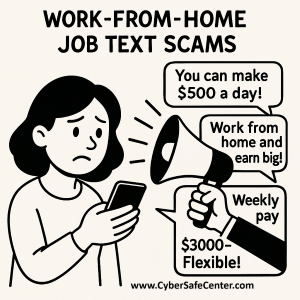Every week I get a text on my cell phone for a work-from home-scam. They claim I can make thousands a month “posting ads,” “rating products,” or “processing data” but these offers are pure scams designed to drain someone’s wallet or steal personal information.

The Federal Trade Commission (FTC) reports that business and job opportunity scams cost Americans more than $367 million in 2022, with a median loss of $2,000. The fraudsters count on you being tempted by low-effort, high-pay jobs that sound too good to pass up.
The pattern is familiar: you’re told you’ll earn great money doing simple online tasks or setting up your own “business.” Then comes the catch. You must pay upfront for supplies, training, or software. In some cases, the scammer sends a check “to cover expenses.” You deposit it, spend some of the money, and then the bank informs you the check was fake, leaving you responsible for the loss.
Another version involves fake recruiters who contact you by text or messaging apps like Telegram. After a quick “interview,” you’re offered the job but only if you share personal data or banking information. Some victims even end up unknowingly helping criminals by reshipping stolen goods or laundering money.
Protect yourself:
- Be skeptical of any job promising high pay for little work.
- Don’t pay upfront for training or materials.
- Verify the company through the Better Business Bureau or FTC.gov.
- Never share personal or banking info until you confirm it’s a legitimate employer.
Real work-from-home jobs exist, but scams are far more common. Take a pause before you reply to that next “amazing offer.” And if you receive a random text like I do, block the number and report it as spam.
